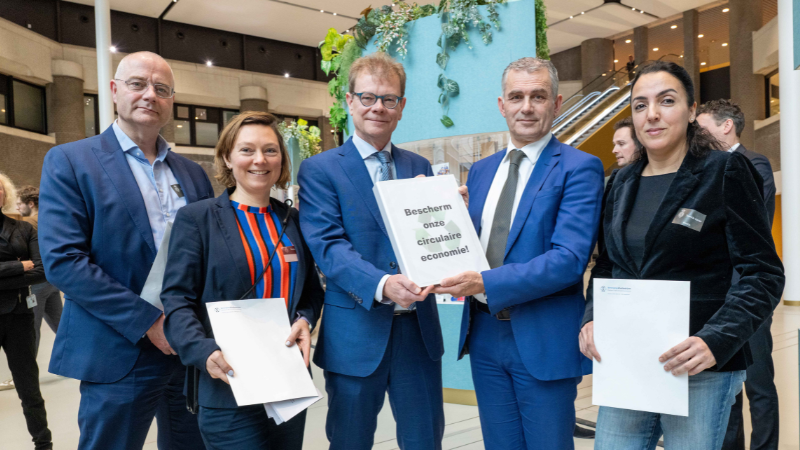
News
26 November 2025
‘Parliament: protect our circular economy’
Stop taxing the waste management industry
THE HAGUE, 25 November – A broad coalition of partners in the Dutch waste management industry call upon the Dutch Government and House of Representatives to abandon the plan to impose an addition €580 million tax burden on the waste sector. Taxes are already higher than in other European countries and are shackling the companies working to close material loops and their partners in the material value chains. They make recycling uneconomic, increase costs to companies and the public, destroy many green jobs, and in doing so undermine the transition to a circular economy. The coalition partners represent more than 8,000 companies and about 600,000 employees.
The Netherlands is in danger of losing its grip on critical raw materials supplies and processing capacity. Higher costs for waste processors mean higher costs for recyclers and manufacturers, which weakens the business case for recycling. The waste sector and production chains must operate and compete in international markets. The additional tax burden will mean a significant and irrevocable loss of competitiveness on these markets, risking mass exports of waste, the relocation of recycling activities abroad, the loss of green jobs, and a decline in willingness to invest in further sustainability and circular innovations. It will also lead to greater dependence on other countries for critical raw materials, production capacity and waste processing options. Furthermore, it will have negative consequences for investments in the Aramis carbon capture and storage project, in which the waste sector provides more than a quarter of the initial capacity.
Plastic recycling under severe pressure
The plastics value chain is an important case in point. For years the Netherlands was among the leading European countries in plastic production and recycling. This position is crumbling: in three years’ time 3 million tonnes of production capacity have disappeared and more than 10 recyclers have gone bankrupt. More than a quarter of the country’s plastic recycling capacity has now been lost. Against the backdrop of growing global demand for plastic, international competition to develop circular technology and production capacity, and the need for companies to become more sustainable, this poses a direct threat to our manufacturing, recycling and waste processing industries and to our material value chains. If we do not act, the Netherlands will lose expertise, green jobs and the ability to meet climate and circular targets. National taxes such as these endanger other material value chains as well.
Public impact
Households will soon be paying at least €40 more in waste disposal charges – even those who separate their waste properly. A national tax on waste and material value chains, wherever it falls in the value chain, will mean higher costs to the public. And it offers nothing in return, not in better recycling, nor in visible sustainability gains.
Government realises the importance of circular raw materials
The Minister of Economic Affairs, Vincent Karremans, rightly states in his letter to Parliament on industrial policy that circular raw materials are essential. This requires better waste collection, sorting and processing, he says – together with the waste sector. But an extra €567 million in taxes will make this impossible to achieve, because the waste – the raw materials – will be processed in other countries. National standards and taxes worsen the competitive position of the whole value chain, hastening the departure of companies and investments from the Netherlands, a process that has already been going on for some time.
The waste management partners are asking the Dutch Government and the House of Representatives to think in terms of opportunities rather than weakening the industry with national taxes. ‘Help us to press on with a package of measures that will help us to realise our circular ambitions and continue processing waste.’
Give cooperation a chance
The value chain collaboration in the Plastics Round Table has shown how important it is that measures are taken as a whole. The Round Table has made firm proposals for market creation, certification and financial and legal backing for circular measures. It was unanimously agreed that national taxes, wherever they are imposed in the materials value chain, will only undermine circular ambitions. Moreover, irrecoverable development costs must be compensated, but the additional taxes will only increase those costs. So let the Plastics Round Table, which resumes discussions on 4 December, continue its work on circular solutions that deliver. And without the pressure of unrealistic financial burdens.
Call to the Dutch Government and House of Representatives
- Abolish taxes that throttle the circular transition; look for ways to find the €567 million outside the waste and material value chains.
- Ensure a level playing field: no disproportionately high carbon tax on the waste sector. Equal treatment with the rest of industry is essential and justified.
- No further increase in the waste tax and, to support circularity, an exemption from this tax for residual (unusable) waste from circular materials sorted and separated using approved processes.
- Temporarily ease the pressure on recyclers by expediting the short-term measures proposed by the Plastics Round Table, such as introducing subsidy and compensation schemes and reducing energy taxes for manufacturers of circular plastic for this industrial value chain.
- Use the Climate Fund to narrow the price differential between fossil and circular materials.
‘Together we can build robust, future-proof material chains and an internationally competitive circular economy and waste value chain.’

A broad coalition of partners in the waste management chain submit the petition ‘Protect our circular economy’ to the House of Representatives spokespersons for Finance and for Infrastructure & Water Management on 25 November. They call upon the Government and the House of Representatives to abandon the plan to impose an additional €580 million tax burden on the waste sector. Harold de Graaf (NRK), Sanne Westra (VNO-NCW), Bart van de Leemput (Vereniging Afvalbedrijven), Tom van der Lee (GL PvdA) and Hanan Yagoubi (FNV)
(photo: Cor Salverius).

